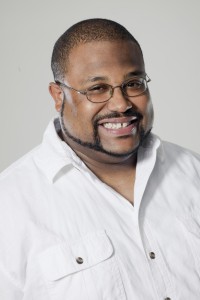Candid Coach: Randall “Big Dog” Harper
 His birth certificate may read Randall, but it is “Big Dog” Harper who has risen to the top of the cheer world at Midwest Cheer Elite in West Chester, Ohio. Named the USASF’s Cheer Coach of the Year in 2012, Harper says that it’s the strong bonds he cultivates with his athletes that keep them all striving for excellence. Find out more about this larger-than-life cheer professional in our exclusive Q&A:
His birth certificate may read Randall, but it is “Big Dog” Harper who has risen to the top of the cheer world at Midwest Cheer Elite in West Chester, Ohio. Named the USASF’s Cheer Coach of the Year in 2012, Harper says that it’s the strong bonds he cultivates with his athletes that keep them all striving for excellence. Find out more about this larger-than-life cheer professional in our exclusive Q&A:
What are some of the unique challenges of coaching an all-star team?
Harper: I wish I’d known that when you’re an all-star coach, you’re not just a coach, but also a psychiatrist. You’re the big brother and the father figure.
As far as challenges go, every athlete is different. Some need you to be stern to motivate them, while other athletes just need you to put your arm around them and say, “It’s okay.” The real challenge is knowing how each athlete on your team ticks. I [make it my business to] know what their family situation is like; I know what they’re doing at school. I can see their body language—if they’re good or if they’re sad—so I know when I need to go up and ask, “Everything all right?”
You’re known as a coach who treats his athletes like family. Why does this work?
Harper: The one thing I know I do best is coach with my heart. And that’s how I want them to compete—with their heart. I treat each athlete like family because it is a family sport. I stop by at birthday parties and graduations, and if someone gets injured, I go to every surgery. I’m there when they go to sleep, when they wake up and at the house afterwards to see if they need anything.
If you treat them like family, they’ll put forth the extra effort for you. They feel like, “He’s got my back, he saw me through my surgery or that hard time in my life, so if he says, ‘Give me that double one more time,’ I’ll do it.” If I’m there for them, they’ll do what I ask them to do without second-guessing.
What’s some advice for someone starting out who dreams of competing in all-star?
Harper: Be yourself! I see tiny kids who look up to others in the gym and they want to be like them. You see kids get burned out when they say, “I want to be a Level 5 athlete right now,” and they’ll try to cheat to get to where they want to be, rather than doing the work and repetitions necessary to truly gain the skills to move forward. Other kids push and push and get burned out, and then they lose the love of the sport. Go at your own pace, and let your own skills dictate when you’re ready to move forward.
How would you describe your coaching strategy?
Harper: They’re the ones who make me look good! Listen, my role is: if the team wins, they get the glory. If the team loses, that’s when I step forward; they need someone to guide them and tell them it’ll be okay. I’ll be the first one to step in front of them and say, “You may have messed up, but you won’t deal with this on your own, and you’ll get better.” And I’ll get a better performance the next time, because they know that Big Dog has their back.








